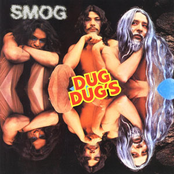Smog

Biography
This 1972 sophomore album found Los Dug Dug's pared down from quintet to trio and effectively remade according to the personal vision of bandleader Armando Nava, who not only took over all songwriting duties, but took it upon himself to play every instrument outside the rhythm section of bassist Jorge Torres Aguayo and drummer Daniel Tello (note: brother Enrique Nava provided a few backing harmonies). Ironically, given its title, Smog also saw Los Dug-Dug's reverting to their native Spanish lang...
This 1972 sophomore album found Los Dug Dug's pared down from quintet to trio and effectively remade according to the personal vision of bandleader Armando Nava, who not only took over all songwriting duties, but took it upon himself to play every instrument outside the rhythm section of bassist Jorge Torres Aguayo and drummer Daniel Tello (note: brother Enrique Nava provided a few backing harmonies). Ironically, given its title, Smog also saw Los Dug-Dug's reverting to their native Spanish language -- a willful about-face from a band responsible for pioneering English-sung lyrics in Mexican rock during the late '60s, and obstinate enough to spearhead the push back to national pride soon after. The end results only heightened Smog's unique cult standing in years to come amongst global heavy rock aficionados, and, in the short term, arguably spelled commercial disaster for Los Dug Dug's at home, but that in no way diminishes the unique daring of these songs. Nava's flute flourishes anchor both the eerily catchy title track and amusingly apologetic "No Somos Malos" ("We're Not Evil"); but it's a frantic melding of his guitar and Tello's flamboyant percussive style that first camouflage the surprising pop single appeal of "Cual Es Tu Nombre?" and then propels the 12-minute mating call (and, one would assume, consummation) portrayed by the album's runaway train centerpiece "Hagamoslo Ahora" ("Let's Do It Now"). A man of many talents and personas, he later comes off flirtatiously lecherous on "Yo No Se" (imagine a Latin Frank Zappa and his Mothers), and shows off his range on a pair of left-field interludes (acoustic guitars and bongos for the Latin-flavored "Buscalo," just the former for the melancholy "Meditacion"), before leading his colleagues on a Beatlesque voyage into orchestrated, psychedelic wonder for gentle closer "Voy Hacia el Cielo (Voy Hacia el Sol)." Like many of the period's great albums, Smog is fueled by an "anything goes" thrill of excitement that, in the case of Los Dug Dug's, as it was for many other acts, sadly proved all too fleeting when they subsequently reversed gears into more commercial territory. But that is of course another contributing factor making Smog that much more compelling as a glimpse into a history as foreign (no pun intended) as science fiction by modern standards, and therefore just as bewitching. Read more on Last.fm. User-contributed text is available under the Creative Commons By-SA License; additional terms may apply.
